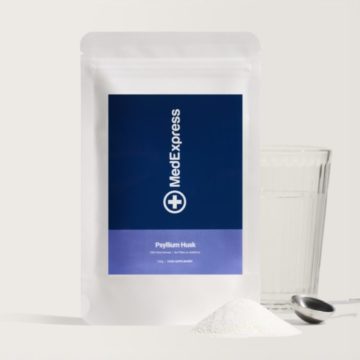Sleep is essential for overall wellbeing, influencing everything from energy levels and mood to the healthy functioning of memory and metabolism. It is recommended that adults aim for between seven and nine hours of sleep a night to support good health.
Not getting enough sleep (less than seven hours per night) doesn’t just leave you feeling tired, it can significantly impact your health, increasing the risk of obesity, type 2 diabetes, high blood pressure , stroke and mental health challenges. [1][2]
Below, we’ll explore how sleep – and sleep deprivation – impacts weight loss efforts and what you can do to support your goals.
How sleep affects hormone production
Our sleep–wake cycle (or circadian rhythm) is, your body’s internal clock that tells the body when it should be awake or asleep. Driven by light exposure, this rhythm signals the brain to release melatonin – our “sleep hormone” – as darkness falls, preparing your body for sleep. [3] Disrupting this cycle, particularly when we don’t sleep for long enough, can impact other important hormones in our body, specifically two associated with weight regulation: ghrelin and leptin.
Role of ghrelin and appetite
Ghrelin, a hormone produced mainly in your stomach, is a key appetite regulator – often earning its nickname as the “hunger hormone”. It stimulates hunger, especially when your stomach is empty. [4]
When we don’t get enough sleep, ghrelin levels increase, which amplifies appetite. Higher ghrelin levels may lead to consuming extra calories, complicating weight loss efforts. [5]
Role of leptin and satiety
Leptin is a hormone that is produced by fat cells and acts as a key appetite regulator by signalling fullness to your brain, helping to reduce hunger. [6] When you don’t get enough sleep, leptin levels drop while ghrelin levels increase, creating a hormonal imbalance that can lead to overeating and may hinder weight loss efforts. [7] Lower leptin paired with higher ghrelin amplifies hunger, particularly for calorie-dense, carb-heavy foods.
Effects of cortisol and stress
Cortisol, often called the “stress hormone”, helps you wake up and stay alert during daylight hours, acting as a natural counterpart to melatonin. However, sleep deprivation may throw your body’s natural cortisol levels off-balance, often remaining elevated when they should decline. Elevated cortisol triggers physiological stress, which can increase cravings for high-calorie comfort foods as the body seeks quick energy. [3]
Sleep and Metabolism
Metabolism describes the processes your body uses to convert food into energy. Think of it as your body’s “energy budget”—the calories needed to power everything from breathing to thinking. When we don’t get enough sleep, this system falters, particularly in how it handles glucose (sugar) metabolism. Short term, this can cause fatigue, hunger, and cravings. Long term, sleep deprivation can impair your cell’s ability to respond to insulin, the hormone that regulates blood sugar. This is called insulin resistance, and can progress to the likes of prediabetes and type 2 diabetes. [6]
Sleep Patterns and Their Effect on Appetite
When we don’t get enough sleep, your body’s hormonal shifts (like leptin and ghrelin imbalances) aren’t the only factors influencing weight gain. Your behavioural choices may also be impacted, creating a cycle of unhealthy eating.
Sleep loss leaves your body craving quick energy, often in the form of high-fat and sugary snacks. That’s why tiredness is often linked to poor food choices, grazing and night-time eating. [1]
Strategies for Improving Sleep to Aid Weight Loss
It can feel frustrating to get caught in a cycle of poor sleep – especially when you’re trying to manage your weight. Here are just a handful of tips that our experts recommend:
- Keep a sleep log to notice patterns or triggers of sleep disruption.
- Stay consistent – try going to bed and waking up at the same time each day.
- Limit use of electronic devices at least an hour before bed – as the blue light can disrupt melatonin production.
- Create a relaxing sleep environment.
- Despite feeling tired, make sure to take part in regular exercise during the day as this will not just help with weight management but also help you sleep better the next night.
If you are finding weight loss challenging, you might wish to consider a weight loss treatment plan. At MedExpress, there are options available that can help curb your appetite, reduce cravings, and promote feelings of fullness under the guidance of licensed healthcare professionals.
As a MedExpress customer, remember you can check in with our clinical team at any time with questions surrounding your weight loss journey. If you haven’t yet begun, you can find which treatment is right for you on our website here.
References
- Papatriantafyllou E, Efthymiou D, Zoumbaneas E, Popescu CA, Vassilopoulou E. Sleep Deprivation: Effects on Weight Loss and Weight Loss Maintenance. Nutrients [Internet]. 2022;14(8):1549. Available from: https://www.mdpi.com/2072-6643/14/8/1549/htm
- How to Sleep Better [Internet]. Harvard Health. Available from: https://www.health.harvard.edu/topics/sleep#sleep0
- National Heart, Lung, and Blood Institute. How Sleep Works – Your Sleep/Wake Cycle | NHLBI, NIH [Internet]. www.nhlbi.nih.gov. 2022. Available from: https://www.nhlbi.nih.gov/health/sleep/sleep-wake-cycle
- Pradhan G, Samson SL, Sun Y. Ghrelin. Current Opinion in Clinical Nutrition and Metabolic Care [Internet]. 2013 Nov;16(6):619–24. Available from: https://www.ncbi.nlm.nih.gov/pmc/articles/PMC4049314/
- Salamon M. Snooze more, eat less? Sleep deprivation may hamper weight control [Internet]. Harvard Health. 2022. Available from: https://www.health.harvard.edu/blog/snooze-more-eat-less-sleep-deprivation-may-hamper-weight-control-202204042718
- Sharma S, Kavuru M. Sleep and Metabolism: An Overview. International Journal of Endocrinology [Internet]. 2010 Aug 2;2010(270832):1–12. Available from: https://www.ncbi.nlm.nih.gov/pmc/articles/PMC2929498/
- Dornbush S, Aeddula NR. Physiology, Leptin [Internet]. PubMed. Treasure Island (FL): StatPearls Publishing; 2023. Available from: https://www.ncbi.nlm.nih.gov/books/NBK537038/



